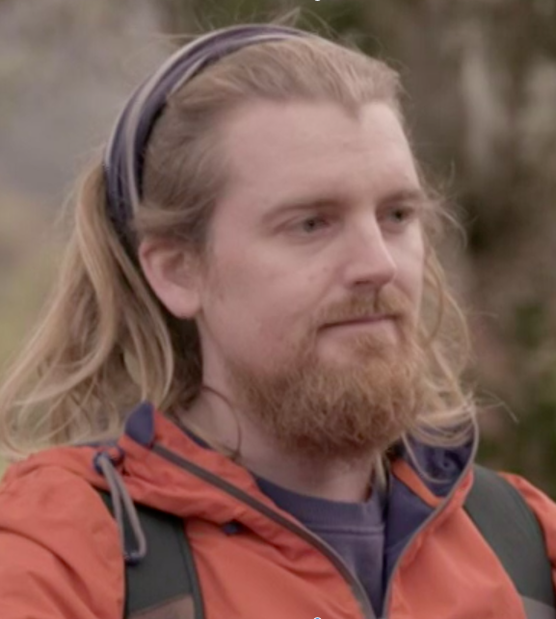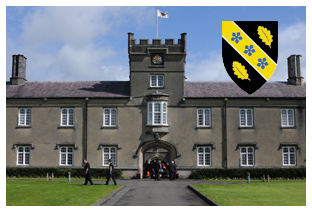Short Course
Cultivating Minds:
Consciousness, Nature and Education
With Dr Jack Hunter
Lecturer in the Sophia Centre at the University of Wales Trinity Saint David and module lead for the MA in Ecology and Spirituality.
An online short course from the Sophia Centre and the Sophia Centre Press
In partnership with the University of Wales Trinity Saint David
And the distance-learning MA degree in Ecology and Spirituality
The Sophia Centre short courses are part of the Sophia Centre’s academic and scholarly outreach programme. The short courses are open to everyone.
What is this course about?

This five-week short course builds on the foundational content in Jack’s last course on ‘Ecology, Spirituality and the Paranormal: Explorations in a World of Many Minds’, with an added emphasis on practical applications.
The course provides an in-depth introduction to the role of spirituality and, education inand practical engagement with the living world, in establishing a sense of connection to the natural world, and for tackling the multi-faceted ecological crisis. Over the course of five live online seminars we will explore a variety of different topics including minds in nature, re-wilding, sacred or spiritual gardening, permaculture, education and human and non-human wellbeing. The course will draw on disciplinary perspectives including anthropology, ecology, consciousness studies and education.
You will be introduced to scientific and cultural perspectives on ecology and consciousness, key debates around re-wilding, practical methods of encouraging biodiversity and a range of models and frameworks for drawing together these strands with other spiritual perspectives, all with an aim to find ways of living better in a world of many minds.
We will look at the ideas of Freya Mathews, George Monbiot, Robin Wall Kimmerer, Bill Mollison and Timothy Morton amongst numerous others.
This course will be of interest to those who wish to understand their place in the world, and to think more deeply about ecology, spirituality and extraordinary experience in a cross-cultural context.
It is more important than ever - at this time of global ecological crisis - to understand our entanglement with the wider ecosystem - and to appreciate the many different ways in which we exist in relationship with the natural world. This course if an exploration of practical engagement with the natural world through philosophy, re-wilding, gardening, education and re-enchantment.
For those unable to attend live or who wish to watch the lecture again, the recording will be available for thirty days.
Key texts:
Jack Hunter, Ecology and Spirituality: A Brief Introduction. (Lampeter: Sophia Centre Press, 2023).
Jack Hunter, (ed.) Greening the Paranormal: Exploring the Ecology of Extraordinary Experience (Milton Keynes: August Night Books, 2019).
Schedule
Week 1: Minds in Nature (Psychodiversity)
This week will give an introduction to the notion of ‘psychodiversity’ - the idea that consciousness, like life in general, moves towards increased diversity of expression. Drawing on perspectives from ecology, philosophy, anthropology and traditional worldviews, this week establishes the idea that we live in a ‘world of many minds’ - human, non-human and other-than-human - which forms the basis for the seminars that follow.
Suggested Reading
Hunter, J. (2023), ‘A World of Many Minds: Toward a Post-Green Vision of the Future’, Post Green: Literature, Culture and the Environment -
Week 2: Re-wilding (Wilderness and Responding to the Ecological Crisis)
This week introduces the anthropocene, the ecological crisis and the loss of tragic loss biodiversity (and with it psychodiversity) currently underway, and explores some of the arguments around conservation, wilderness and re-wilding. The cultivation of psychodiversity as a parallel to biodiversity in wilderness will be discussed, as well as the role of re-enchantment.
Suggested Reading
Hunter, J. (2020), ‘Harmony and Ecology,’ The Harmony Debates -
Week 3: Gardening (Closer to home - things we can do)
This week introduces permaculture principles and gardening as strategies for contributing to ecological restoration on a local scale. Gardens have long been considered as meeting places between the human and non-human worlds, and there are global traditions of spiritual and magical gardening that honour and nurture the non-human world. We explore the intersections of permaculture, gardening and spirituality.
Suggested Reading
Hunter, J. (2022), ‘Gardens and Gnomes: Statues, Extraordinary Experiences and Subtle Ecologies,’ The Wollaton Gnomes: A Nottingham Fairy Mystery -
Week 4: Education (Teaching, learning and worldview)
This week explores the role of education in the development of worldviews and and the formation of pro-environmental behaviour. What approaches to education are best suited help to promote a sense of connection to nature, and to build a meaningful relationship with the natural world? What role does education play in fostering worldviews that see the world as alive and filled with mind?
Suggested Reading
Hunter, J. (2020), ‘Sacred Landscapes and Philosophical Gardens: RE as a Response to Climate Change,’ RE Today Magazine -
Week 5: Wellbeing (Flourishing for Human and Non-Human)
The final session surveys research on the positive psychological, social and spiritual impacts of enhanced connection to nature for humans, and explores how non-human flourishing might also be encouraged by changing our relationship with the living world.
Delivery
The course is taught live online using Zoom and recorded in order to enable you to follow the seminars if you cannot attend live. Each seminar will have time for Q & A's. You will be able to access the recordings for personal revision for thirty days.
Moodle
All students will be able to log into the course page on Moodle where all the recordings of the lectures will be uploaded after each session. Also in this area are extensive support material plus a weekly discussion forum for additional questions or general comments.
Dates
The seminars will be held on Tuesdays at 16:00 – 18:00 UK time. There will be five seminars:
- 19th November
- 26th November
- 3rd December
- 10th December and
- 17 December
Course Books
You can follow the lectures alone, but can also obtain your own copies of the key texts. You can purchase from your favourite bookshop or from Amazon (below).
Jack Hunter, Ecology and Spirituality: A Brief Introduction, Lampeter: Sophia Centre Press, 2023.
Buy in the UK
Buy in the USA
Jack Hunter (ed.), Greening the Paranormal: Exploring the Ecology of Extraordinary Experience, Milton Keynes: August Night Books (2019)
Buy in the UK
Buy in the USA
Bio

Jack Hunter, PhD., is an anthropologist exploring the borderlands of consciousness, religion, ecology and the paranormal. He is an Honorary Research Fellow with the Alister Hardy Religious Experience Research Centre, and a tutor with the Sophia Centre for the Study of Cosmology in Culture, University of Wales Trinity Saint David. He teaches on the MA in Ecology and Spirituality and the MA in Cultural Astronomy and Astrology. He is also a tutor with the Alef Trust on their MSc in Consciousness, Spirituality and Transpersonal Psychology. He lives in the hills of Mid-Wales with his family.
Registration
The cost which covers all five lectures is £150.
Students and graduates of the University of Wales Trinity Saint David can enrol at the University rate of £120.
By registering I agree to follow the Sophia Project netiquette guide.
To register and pay, please click the link to EventBrite.
The acknowledgement of payment from Eventbrite will be sent to the email address that you have registered with Eventbrite. The day before the course starts, the link to join the seminar will also be sent to this address. If you wish the link to be sent to a different email address, please contact sophiacentre@sophia-project.net.
You should register by Eventbrite if possible but, if you can't, email Dr Nick Campion at n.campion@uwtsd.ac.uk and you can arrange to pay by cheque or bank transfer.
Terms and Conditions
Fees and Refunds – Fees must be paid in full before the commencement of the course. Refunds will be made if students withdraw from the course before it commences. There are no refunds after students log into the Course Moodle page, which is opened up two days before the course begins.
Forum conduct - All students are expected to follow the netiquette guide and be respectful of other students and the tutor in their forum posts. The course tutor will remove any postings they consider to be inappropriate. The course tutor also reserves the right to block a student from posting on the forums if the student disregards a request by the tutor to revise their forum conduct.
Zoom conduct – Students attending the Zoom lectures live are expected to be focused on these lectures and only use the chat box for question directed at the lecture material. Students who misuse the chat box will be removed from the lecture.
Technology – It is the student's responsibility to ensure that they have sufficient broadband and sufficient skills in operating their computer or tablet to enable them to engage with this online course.
Sophia Centre Short Courses are taught as part of our outreach programme from the University of Wales Trinity Saint David. If you would like to take your studies further, you may apply for our unique, on-line, fully accredited Master's programme in Cultural Astronomy and Astrology, the only academic programme in the world to look explore our relationship with the sky, and the history, philosophy and culture of astrology.
Welcome to the public outreach page of the Sophia Centre for the Study of Cosmology in Culture at the University of Wales Trinity Saint David, with information about studying with the University, as well as links to related conferences, classes, publications and events. To go straight to the Sophia Centre's University page please go here.
Please follow our guidelines on Netiquette.
Click the link below to join our mailing list to keep informed of Sophia Centre events:
Mailchimp
Upcoming Events
2026
27-29 Apr,
Sophia Centre
conference Istanbul 2026

























